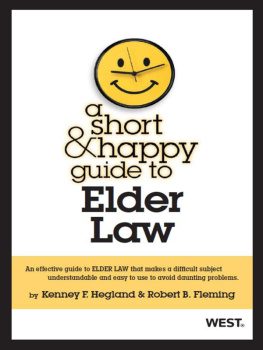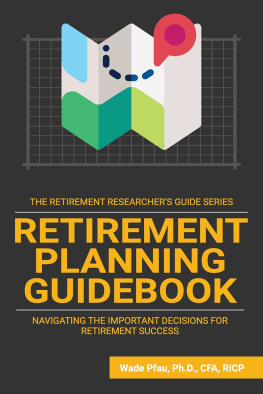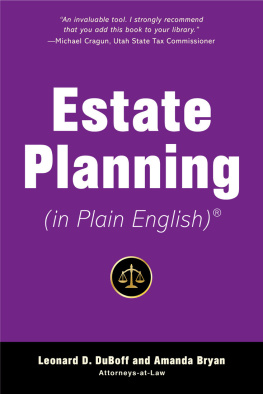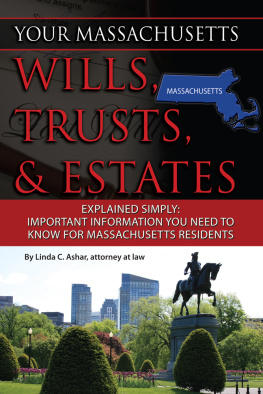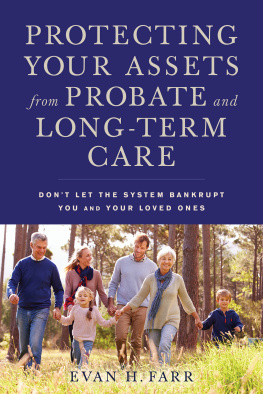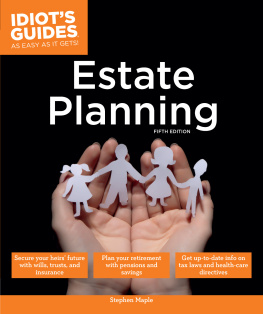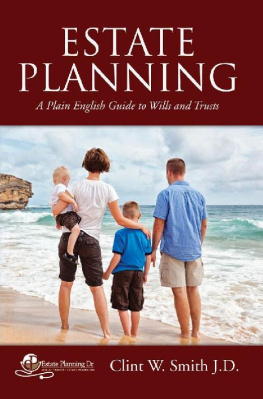Landmarks
Page list

i

a short & happy guide to
Elder Law
By
Kenney F. Hegland
James E. Rogers Professor of Law, Emeritus
University of Arizona
Robert B. Fleming
Attorney, Fleming & Curti, PLC
Tucson, Arizona
Series Editor
Paula A. Franzese
Peter W. Rodino Professor of Law
Seton Hall University School of Law

Mat #41315017
ii
This publication was created to provide you with accurate and authoritative information concerning the subject matter covered; however, this publication was not necessarily prepared by persons licensed to practice law in a particular jurisdiction. The publisher is not engaged in rendering legal or other professional advice and this publication is not a substitute for the advice of an attorney. If you require legal or other expert advice, you should seek the services of a competent attorney or other professional.
Nothing contained herein is intended or written to be used for the purpose of 1) avoiding penalties imposed under the federal Internal Revenue Code, or 2) promoting, marketing or recommending to another party any transaction or matter addressed herein.
Short and Happy Guide Series is a trademark registered in the U.S. Patent and Trademark Office.
2013 LEG, Inc. d/b/a West Academic Publishing
610 Opperman Drive
St. Paul, MN 55123
1-800-313-9378
Printed in the United States of America
ISBN: 978-0-314-28381-8
iii
Dedication
Time held me green and dying
Though I sang in my chains like the sea
Fern Hill, Dylan Thomas
To Barbara and Rhonda
And to those who choose to sing
v
Table of Contents
vi
vii
A Short & Happy Guide to Elder Law
ix
Why a Short and Happy Guide to Elder Law?
Wow! Im a lawyer; I even teach law; Im a smart, educated guy. How can I be so stupid? Here I am, merrily going about my business, and hard times, they are coming, coming my way.
This was my reaction when, well into my fifties, I started teaching Elder Law. I was shocked how little I knew of the problems I will face and my family will face. I became a nuisance, boring my friends and colleagues with the virtues of Living Trusts, with the necessity of Health Care Powers of Attorney, and with the compassion and love of Hospice.
I sat down with Robert Fleming, a lawyer who has spent his career representing seniors.
What are the problems seniors and their families are likely to face and how can they use the law to solve them?
We wrote a book. It was too long, too detailed, and too boring. Folks who needed the information werent getting it; families would suffer without having a resource to turn to. We decided to do this bookshorter, less detailed and, hopefully, spiffy.
Our audience: law students and lawyers, counselors, health care workers, folks who work or volunteer at Area Councils on Aging or Adult Care Centers, indeed anyone who helps seniors. Seniors and their families will also find the practical guidance handy and we occasionally address them directly.
Whoever you are, skim the book, pause to read what catches your eye, note what you may need to come back to. You will be better informed and more apt to tackle the challenges that lie ahead; guaranteed.
x
We offer a lot of practical advice. Law takes you only so far.
Happy ? We want you to be better prepared for things that go dump in the night and a book on the shelf does no good at all. Fred Rodell, a law professor at Yale, once wrote:
There are two things wrong with almost all legal writing. One is style. Readers like a dash of pepper or a dash of salt along with their information. They wont get any seasoning if lawyers can help it. Lawyers would rather be dignified and ignored.
We wont be ignored. We will lighten your load with bad jokes and good poetry. Our topics do not immediately lend themselves to happy. Late night comedians do not open with riffs on How to talk to your family about end-of-life matters. Yet us humans are blessed to see a glimmer of humor even in the darkest of times:
Art Buchwald, newspaper man, was dying of kidney failure. At one point he decided to go off dialysis knowing that he soon would die. He gave one last interview to his old friend, Tom Brokaw.
Art, what will you miss most?
A pause, some thought, and then Global warming.
PART 1
Some Basics
__________
__________
Avoid first names and (worse yet) condescension. Mr. Peterson and Mrs. (perhaps not Ms.) Blaine, not Charlie or Rose, and never Dear or Honey. Strive to be warm and friendly, but professional.
You will need to be clear. Your client may have difficulty hearing you, or reading your brilliant writing. Talk slowly and distinctly, but do it without being obvious. Do not shout. Do not ask clients if they have trouble hearingthey will claim that they do not, but may be insulted by the suggestion of infirmity.
Dont cover your mouth while talking, or turn away your client. Pay attention to physical arrangements: are your chairs too firm or too soft, or too low, or too hard to get up from? Is your conference table arranged so your clients see you in a halo of light from the bright windows? Are you talking past your client to their adult child, or caretaker, beside them?
Connect personally. A casual question might work wonders. Do you remember when President Kennedy was shot?
Delivering twins on a commune in Maine, coaching football in Lubbock, getting a PhD in Berkeley. What a great opportunity you have to hear incredible, interesting stories. There is more wisdom and humanity in those stories than in all the best-sellers.
Most of all, like they used to say, respect your elders. Though they may actually be happier than you (studies confirm this), they are facing problems you may have heard about but likely never experienced. Later well try to give you at least some idea of what it is like to grow old. Realize however that knowing is not experiencing . Aging is not for sissies. There are more-or-less constant aches and pains, death of long-time friends, and the background noise of chariots hurrying near.
What would you like to accomplish? Do you see any problems with that? Any alternatives? Get their thinking before offering your own. Get it from themdont assume that their children, or even their spouses, know exactly what they want you to do for them. Dont stereotype folks, thinking they all want the same things and are facing the same problems.
Make sure your advice is understood and remembered. You are an expert in your field and it is hard to recall what it was like when you were first learning the ropes, when you nodded to the teacher, Yes, I understand when you hadnt a clue. What seems clear to you, what seems painfully obvious, just aint. Explain. Ask the person to repeat your advice, thus assuring it was understood and will be remembered. It may also flag things you didnt cover: Does that mean I have to change the beneficiaries on my IRA, too?
Follow up letters are great. Use a large and readable font, (studies indicate that sans serif fonts are easier to read, and that sizes between 12 and 14 tend to be optimum), consider double spacing, use short sentences and paragraphs, and use the active voice. Avoid bold, italics and all-caps, or use them sparingly.

